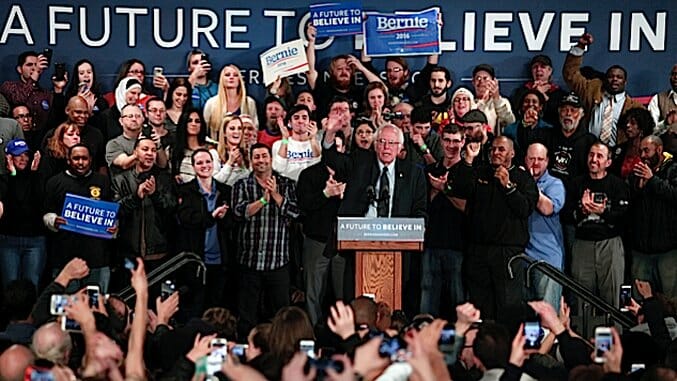Eight Political Myths That Were Shattered in the Primaries This Week
Photo by Bill Pugliano/Getty
It’s been an odd, unpredictable seven days in the presidential primaries. In a week where nine states went to the polls, chunks of the electorate defied voting expectations, pollsters lost significant bets, and candidates near-enough counted out made shocking comebacks.
Some of what went down was just business as usual. The GOP continues to inspire a high turnout, the electorate is still voting against the establishment candidates (first goes Bush, now Rubio appears to be on his way out), while Dem voters choosing between Clinton and Sanders remain divided along lines of age and fortune. Otherwise, it was a week where presumed truths were proven false, and where Ted Cruz possibly outing himself as a Brony wasn’t even the most surprising thing that happened. Here are some key myths that got shattered this week.
1. Bernie Sanders doesn’t appeal to non-white voters
In southern states like Alabama and South Carolina, Hillary Clinton had been winning with as many as 90% of black voters, easily beating Bernie Sanders with that demographic. So, quite rightly, the pundits had been asking whether the Sanders campaign was ever going to make inroads with more than just Caucasians. Well, on Tuesday, in Michigan, Sanders got 31% of the African-American vote, a significant enough number to bring him victory in a state where 20-30 percent of likely Democratic voters are black. Either the Sanders campaign was right on the money when it assumed black voters in the north would be more receptive to Sanders’ message, or Clinton’s firewall is breaking. (It’s probably not the latter, considering Sanders suffered his heaviest defeat in Mississippi — the state with the largest percentage of African-Americans — the same night he won Michigan.)
This follows Sanders’ strong showing among Latinos in Colorado and a heavily disputed ‘victory’ with Hispanic voters in Nevada. It’s also interesting to note that Sanders did very well with Michigan’s Arab-American Muslim community on Tuesday night, though that’s perhaps not so surprising: Sanders is, after all, the most popular of any candidate among Asian-Americans.
2. It’s strictly a Trump revolution
It was said before this week that the only evidence of a ‘political revolution’ was to be found on the Republican side. Rather than Bernie Sanders, it looked like Donald Trump was actually the one driving people to the polls. This week, however, that changed.
Of Bernie Sanders’ wins since Saturday, there was reportedly “massive” turnout in the Nebraska caucus; record breaking turnout in Kansas (more than 40,000 voters, 10% up from 2008); and record breaking caucus turnout in Maine (about 48,000), with some areas so overwhelmed they were forced to cancel the actual caucusing and just hand out paper ballots instead. Turnout in Tuesday’s Michigan primary also broke a record held since 1972, with 2.5 million stepping out to cast their vote. Many of these were for the GOP, but the Democratic field was also flush with voters, with some Dem polling stations even running out of ballots early. Bernie Sanders’ ‘revolution’ may have started later than he anticipated, but he’ll be pleased to see it’s finally underway.
3. The polls are rock solid
A lot of faith has been put into polls by pundits this primary season, and for good reason. The polls, up until this week, had been predicting the outcome in most states with a solid degree of accuracy. It got to the stage where commentators had basically been calling votes before they’d even happened. Then along came Michigan.
Hillary Clinton’s shock loss in the Wolverine State proved that not a 10, nor 20, nor 37-point deficit in the polls necessarily means a loss on the day. In what has been called “one of the greatest upsets in modern political history,” Bernie Sanders defied an average 21-point shortfall in the polls to win Michigan by some 19,000 votes. On the GOP side, both Ted Cruz and John Kasich also made unexpectedly strong showings through the week, with Cruz snatching three states from Donald Trump and Kasich in seven days doubling the number of delegates he’d amassed in the previous month. This was after Trump had been declared the runaway frontrunner, with pollsters finding him ahead in most states polled.